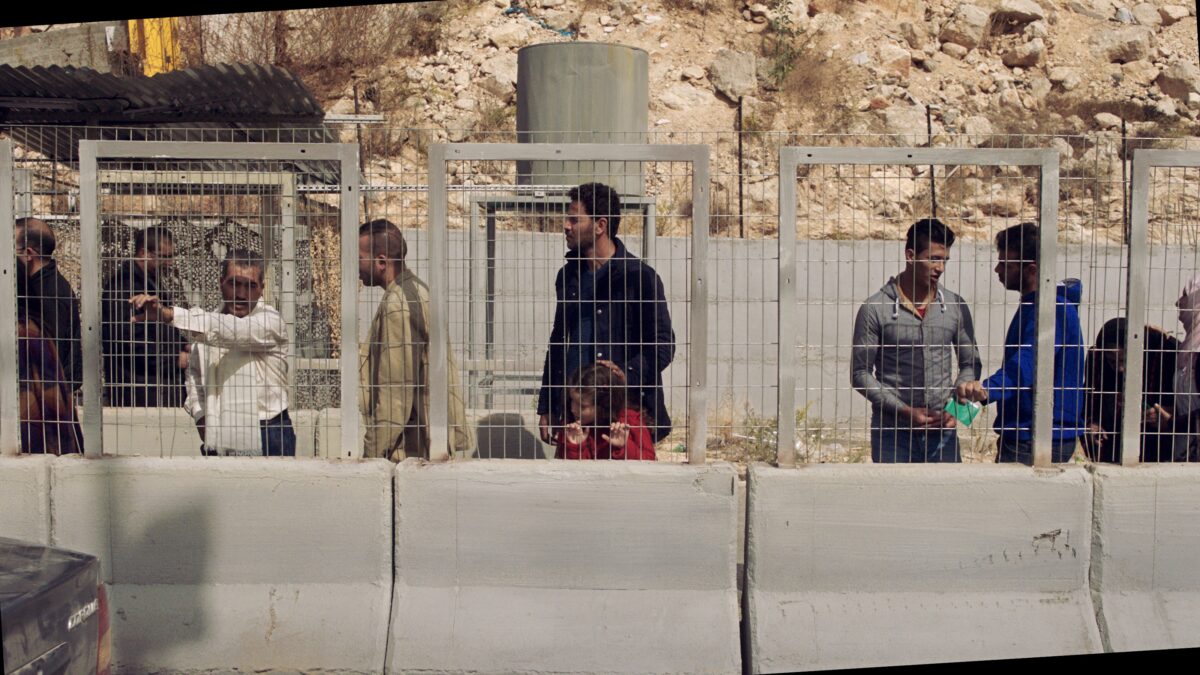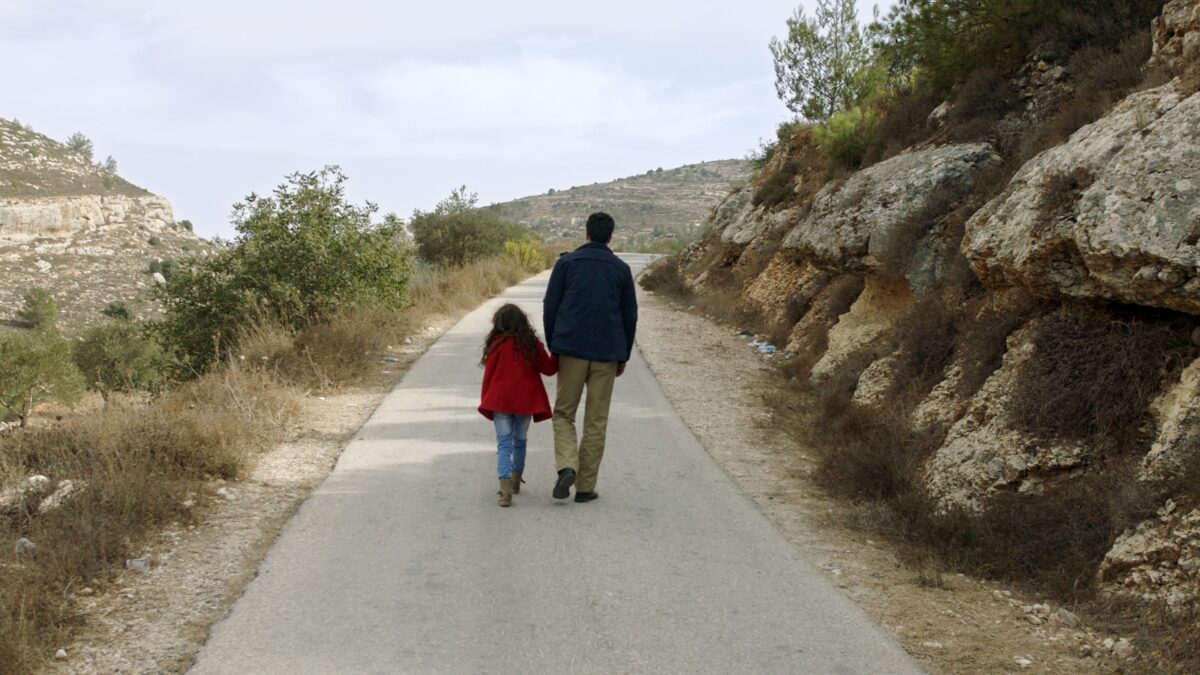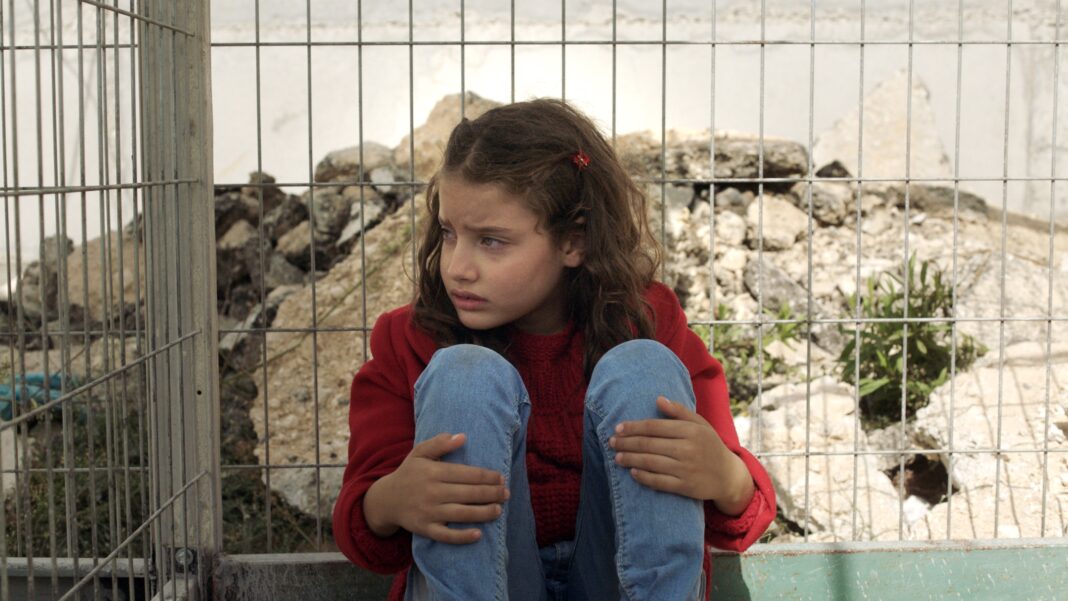The conflict of the Middle East, coupled with a father’s desire to bring home a special present for his family, forms the basis of Farah Nabulsi’s new acclaimed short, THE PRESENT.
Film And TV Now recently spoke with the director about her work and her reflections on the area.
FILM AND TV NOW: The simplicity of everyday life is more complex in this film for the father and daughter when they go to buy the present and shopping. Tell us more about the issue of movement in the West Bank.
FARAH NABULSI: The approximately 22% of what remains of historic Palestine is made up of Gaza and what is known as the West Bank. (The other 78% having become Israel since 1948, through a colonial enterprise and ethnic cleansing).
Gaza, as many know has been under an inhumane Israeli (and Egyptian government aided) blockade, for more than 12 years now, but in the West Bank, Palestinians are subjected to over 100 Israeli military checkpoints, another 100 or so ‘flying’ check points (which means they can appear anytime, anywhere), separate road systems, curfews, the separation wall, and a severe and convoluted permit and ID system.
These control mechanisms are all an assault on this basic human right of freedom of movement for Palestinians, that in turn destroys so many other rights – like the right to get to work and earn a living and put food on the table for your children, like being able to visit friends and family, tend to your lands, get to a hospital, a clinic, school, university – or in the case of my film, for some people, something as simple as being able to go and buy someone you love a gift!
FTVN: You are the daughter of Palestinians who made their home decades ago in Britain. How much of a struggle was it to leave the area and how much of a challenge was it to adapt to UK life?
FN: My parents were lucky in the sense that they did not come to Britain as refugees. My father came to do his Phd and work. He was in Egypt beforehand. My mother initially went to Kuwait in 1967 when war broke out, which was initially not easy of course.
She then managed to get a job transfer at the time to the UK where my parents eventually met. They adapted and assimilated well. To be honest I think people were more loving, open and welcoming in the early 70s then they are now.
FTVN: Tell us about your cast.
FN: Saleh Bakri, who plays Yusef, is an accomplished brilliant film and theatre actor who has starred in a number of successful and award-winning feature films including at Cannes, Locarno and Berlin.
The fact that he wanted to play the role of Yusef in this short was so precious to me. I had seen him in a number of other films and when I wrote the story, he was the actor that I really wanted for the role. Once he was on board there was no need to audition anyone else.
I needed my protagonist to be delivered by someone who really understood at his core what the essence of this performance was about, and I believe Saleh embodied it beautifully and with the real intensity and dignity he brings to all his work.
Maryam Kanj plays Yasmine. She’s a strong, bright and beautiful girl who is not a trained actress at all, but who I fell in love with immediately. She has these big expressive eyes and a confident personality around adults and strangers, but above all it was her high emotional intelligence that really struck me the most.
She was introduced to me by her aunt, who happened to be a friend of mine. (Completely coincidentally Maryam’s actual real father, Nael Kanj was already being brought on board to be set production designer for the film). I knew from the get go Maryam was the one.

FTVN: Tell us about your production team.
FN: On the ground we had an almost completely Palestinian team made up of film industry veterans like Producer Ossama Bawardi and Production Designer Nael Kanj, as well as line producer Noor Hodaly and a group of hardworking, up and coming talented students of film involved.
I was also blessed to have accomplished French Cinematographer, Benoit Chamaillard as DoP, who has previously worked in Palestine as DoP on successful films like Anne-Marie Jacir’s Salt of this Sea.
FTVN: Have you gone back with your parents to the territory much?
FN: We went as children many times, then around the first intifada (uprising) in 1988, nothing for over 20 years. I have been back numerous times in recent years since – but sadly with neither of my parents.
FTVN: Are there other stories of your parent’s generation that you are keen to explore in your future works?
FN: From that generation and the one just before them, the stories are endless and some are so absurd, unjust and moving, you couldn’t make them up even if you wanted to, but that said, at this point in time I am personally more interested in the current, present-day stories that are equally engaging and moving, but more pressing to tell.
FTVN: You left the corporate world to become more involved in film-making. What informed your decision to change career paths?
FN: It sounds cheesy, but it came a little while after a series of life changing trips to Palestine. I felt compelled to tell the human stories I was coming across during my travels and had a deep desire to express myself creatively.
Having always loved film and from a young age, I was always the storyteller with a very vivid visual and verbal imagination, film really felt like the way to go and now I have the bug and haven’t looked back.

FTVN: Where did you shoot and for how long?
FN: We shot entirely in the Bethlehem area over 6 days.
FTVN: How did you raise finance for the film?
FN: Personal funds, friends, family, a film grant from the Doha Film Institute and a few private individuals who are supporters of the arts and believed in my vision of storytelling.
FTVN: Diversity and gender are big news at the moment. What progress do you feel has been made in this area and what are your dreams and hopes for the future?
FN: I think we are heading in the right direction, but it’s important that roles and stories remain authentic and not contrived. We still have a long way to go, especially when it comes to minority representation and inclusion on and off the screen and female directors being recognised and funded. Of course, I hope we get to a place where these important issues are no longer issues.
FTVN: How has COVID-19 affected your development and evolution as a film-maker?
FN: Honestly, The Present has been doing really well at film festivals during this period, so while I haven’t been able to travel for them, in the bigger scheme of things, I really can’t complain. Having to stay put and mostly at home has ment that I have had the time to start working on developing what I hope will be my first feature film. Once Covid is behind us, I hope I will be in the position to move straight into production.
FTVN: Finally, what are you most proud of about THE PRESENT?
FN: The insane awards and reactions the film has had from both international audiences and juries. It tells me that the film is resonating. It tells me that people are appreciating the art and the meaning. What more could a film-maker want?





























